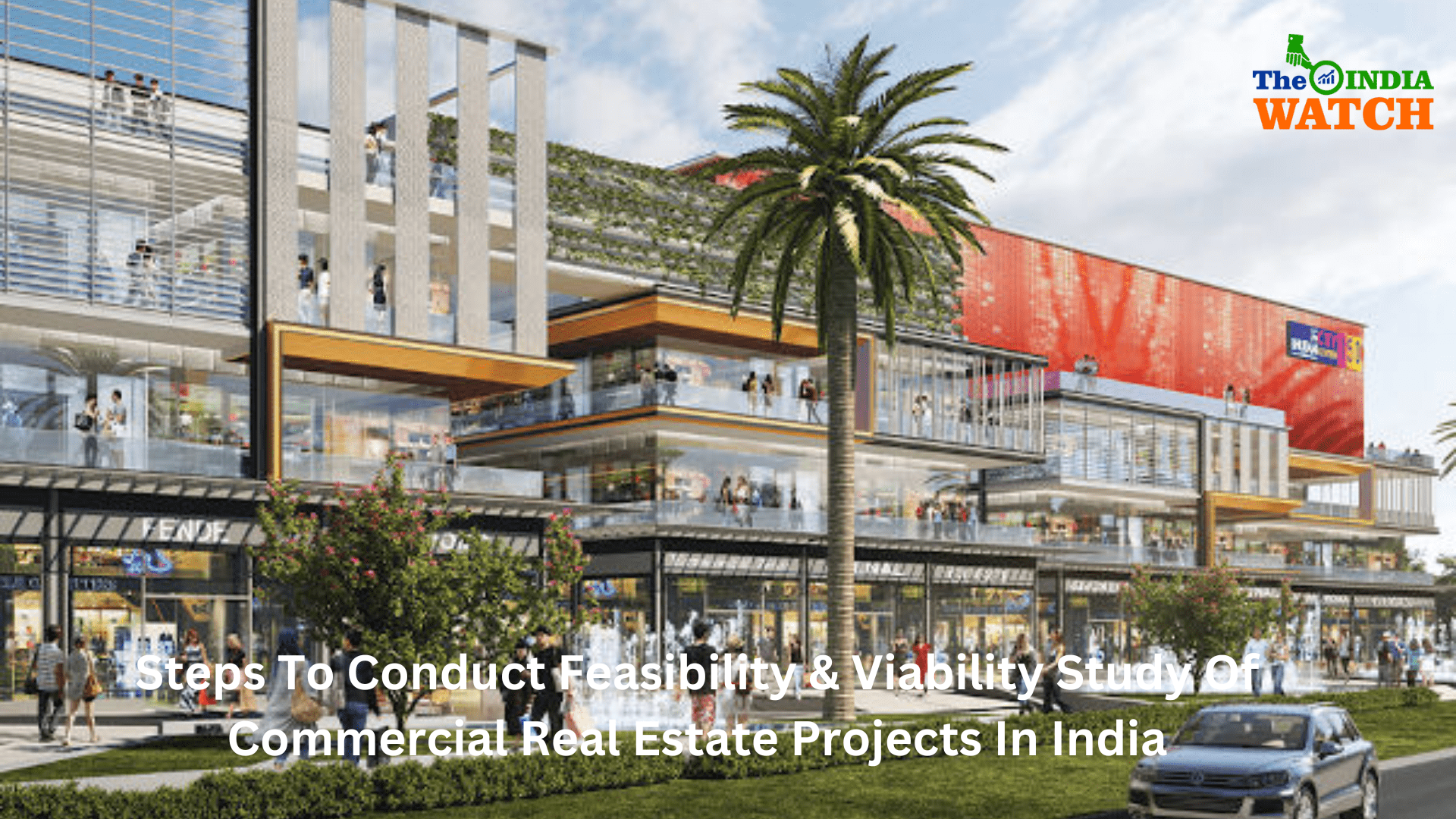-
Your trusted market research partner
- info@theindiawatch.com
- 8076704267

Steps To Conduct Feasibility & Viability Study Of Commercial Real Estate Projects In India
In this blog, know about How To Conduct A Feasibility Study For A Commercial Real Estate Project and many other details.
In the face of the lockdown, when physical interaction was suspended, most of the business and companies operated digital via the WFH model. Though flight to virtual was not easy, businesses showed resilience and operated seamlessly despite the crisis.
From here there comes more demand for real estate and hence, eventually brought the need for Real Estate Feasibility Study.
The emergence of remote working was so pertinent, that many suggested the end of physical offices spaces. This was further marked by limited investments in offices and a slow down in leasing.
However, the muted demand did not last long, as the market bounced back in 2022, with the overall office leasing crossing 70 million sq. ft. In 2023, the office leasing activities have touched 74 million sq. ft. The positive momentum, continued in 2024, with total leasing set to reach 85 million sq. ft in top-8 cities.
The growth in the office leasing is rooted in multiple factors such as surge in economic activities, increased FDI inflow, growth in REITs, rise of co-working spaces and much more.
Around quarter of the leasing activities are led by the ICT sector, making them one of the major occupier categories. Other key categories include BFSI, GCCs, engineering & manufacturing, flexi spaces, etc. So, thus there arises the need for Feasibility Study & Viability Study For Office Real Estate In India.

Source: Cushman & Wakefield, The India Watch Analysis
GCCs becoming a key Growth Enabler
Industry pundits believe Global Capability Centres or Global Inhouse Captives (GICs) as they are sometimes called will be a key growth enabler in India’s office demand. In future around 30-35% of the office transaction will be led by GCCs.
Since 2000s, India has been favoured ground for GCCs. However, at that time, GCCs were mostly lured by affordable skilled and semi-skilled workforce and were operational in IT and customer support verticals, However, the space itself is vertically transforming as the country now offers a wide range of options such as R&D, analytics, digital transformation, market research, besides IT and ITeS to the discerning global business.
A wide range of businesses and MNCs including retail, banking, engineering & technology, healthcare, IT, consulting is setting up their offshore business units in India to leverage skilled manpower, competitive labour rates, improved infrastructure, and favourable government policies.
It is estimated that currently there are around ~ 1800 GCCs active in India which will rise to 1900 by next years. By the end of 2030, total GCCs are set to reach 2400 in India. Currently, there are around 1.9 million workforces employed in GCCs and this can reach up to 4.6 million by 2030, growing at a CAGR of around 16%. This will bring momentous shift in the office occupation.
Around ~ 50% of the demand will be concentrated in markets such as Hyderabad, Bengaluru, and Chennai. This will be followed by other market such as NCR, Mumbai, and Pune. While most of the GCCs prefer tier-1 cities, many will be drawn towards tier-2 cities as well such as Vizag, Jaipur, Ahmedabad, Indore, etc. The development of more real estate becomes a necessity, hence there is more scope for Real Estate Development Feasibility Study.
Flexible workspaces set to redefine office leasing
India’s flexible workspaces comprising of co-working and managed office spaces are now growing at a scorching pace. As per Avendus capital report, the total flexible workspace market has reached 61 million sq. ft in 2023, rising sharply from 2019, when it was pegged at 29 million sq. ft. The market is slated to reach 126 million sq. ft. by 2028, growing at a CAGR of 15.6%. The market will reach a total size of USD 9 billion. This also makes India the second fastest growing flexi office space market in the world after USA. Thus, Feasibility Services For Flexi Office Projects In India is surely in demand.

Source: Avendus Capital, The India Watch Analysis
Start-ups, MSMEs, and freelancers are one of the major growth driver of flexi spaces. However, MNCs and bigger corporates are also showing interest in the segment as they contain cost and have better lease-to-operation (6 to 12 months compared to 2-5 years in regular offices). Co-working spaces can also promote overall wellbeing of the employees and offer better networking opportunities. Co-working is becoming aspirational for many as it involves work, network, and recreation, all combined together.
Many MNCs are adopting hub and spoke model post pandemic where in they have key office (hub) in the CBDs followed by a network of other smaller offices all over the city. For such networks it makes perfects sense to lease out smaller co-working spaces of around 50-100 seats each.
Bangalore and Mumbai are some of the biggest markets in the segment. Meanwhile the co-working culture is also picking up in tier-2 cities such as Vizag, Patna, Lucknow, Bhopal, Nagpur, Ahmedabad, etc. The expansion is rooted in increased migration, surge in remote working, and robust indigenous entrepreneurial culture in such cities.
Steps to conduct a Feasibility & Viability Study for Commercial Real Estate Project in India
The interest in India’s commercial real estate will continue to rise. Investors, developers, office operators, design consultancies, facility management companies will continue to pivot to the space to cater to increasing demand. This will also require demand for tailor made research and advisory services such as feasibility studies.
Feasibility Study For Commercial Real Estate Investment are not just essential for fund raise but can also give a deeper insight about the project and the market. It can contain risk and enable better business decision making.
Mentioned below are the broader blueprint of a feasibility study of a commercial real estate project in India. It will tell you How To Conduct A Feasibility & Viability Study For Commercial Real Estate Projects as done by India Watch.
- Market overview, sizing and insights
- Detailed location analysis (social, economic, logistics, infrastructure-based, etc.)
- Existing and future supply lines, market break-up,
- Commercial leasing trends and pricing trends including future growth
- Insights on key categories of occupiers
- Growth drivers and challenges
- Future evolution of the market
- Insights on major competition and supply side information
- Customer assessment, demand, and market gaps
- Financial planning, projections, and ROI estimation
- Break even analysis, sensitivity analysis, financial recommendations, etc
- Growth roadmap and key success factors.
If you are a developer, investor, property advisory, or any other business entity looking for a Feasibility Study For Commercial Real Estate Projects In India, feel free to connect with us. Drop us a mail at info@theindiawatch.com or WhatsApp/ Call at +918076704267. Someone from our team will get in touch shortly to discuss further.
Read Also- Feasibility Study Services for Preschool Ventures in India
Read Also- Market Reaserch & Feasibility Study Services to Start Dental Healthcare Ventures in India
Raed Also- India’s EV Sector 2030: Plenty of Opportunities Abound for Indigenous Manufacturers
Read Also- Chai Point and Chaayos Manages 51% of tea café business in India- The India Watch study reveals
Read Also- The wellness SPA sector in India is growing at a CAGR of 15.5%
Read Also- Project Feasibility Study for Detergent Business in India
